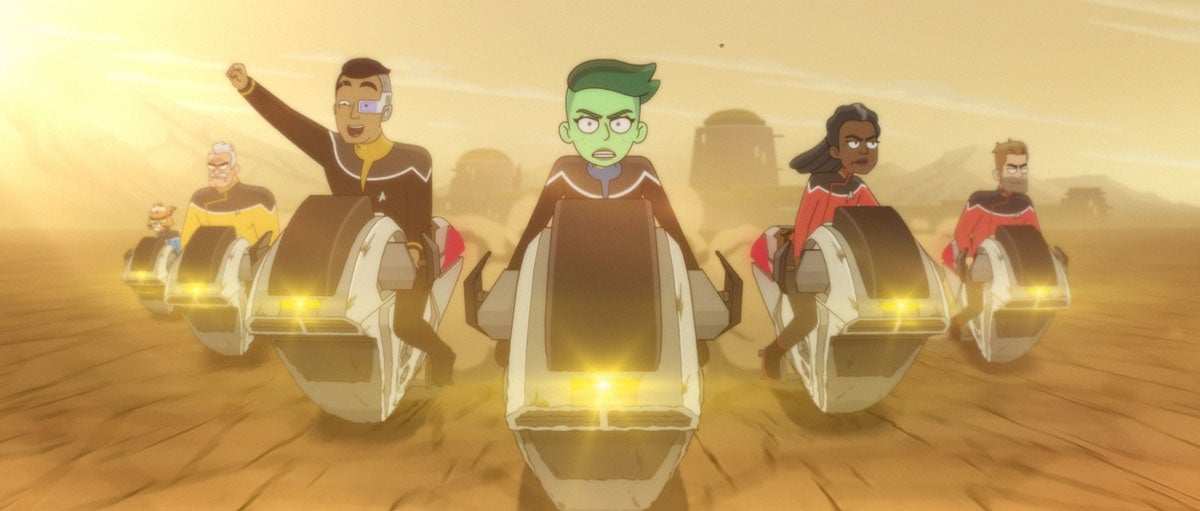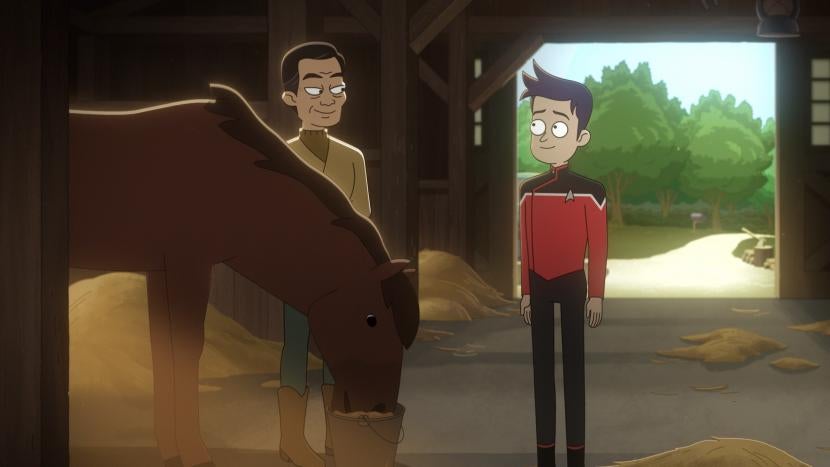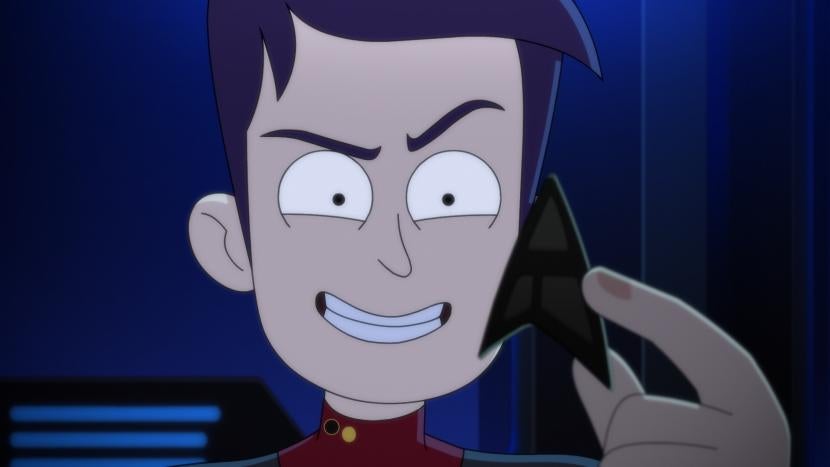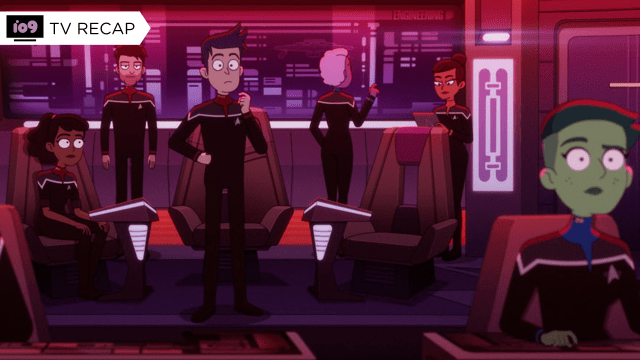Sequels are always a challenging endeavour, in Star Trek or otherwise. But there’s something about Star Trek cinematically that makes it really difficult — the franchise rarely ever escaped the cursed of the odd-numbered sequel, and so it’s fitting that Lower Decks approaches its own first attempt at a direct sequel with a sense of trepidation… and mostly makes it work.

“Crisis Point II: Paradoxus” is, as the name implies, a direct sequel to the movie-riffing delights of “Crisis Point,” the late-game Lower Decks season one episode that was the highlight of an already incredibly strong season. “Paradoxus” — the name Boimler has given his holo-sequel to Rise of Vindicta, where he plays the heroic Captain Bosephus Dagger of the U.S.S. Wayfarer — has a lot to live up to. That’s in terms of both the pastiche it brings to the table, given that “Crisis Point” already fantastically parodied Star Trek’s cinematic self, but in also what it can bring to the table on its own terms. Thankfully, the latter is the thing that matters most here, and it’s what “Paradoxus” largely gets right.

That’s not to say the pastiche isn’t fun — the time-hopping adventure Boimler has written for him and his friends definitely plays on some Trek classics, and there’s everything from the fancy upgraded movie costumes (the Lower-Decks-meets-TNG-movies vibe is so good it should almost become the show’s main uniform) to an absurd action vehicle chase sequence. Making the Romulans the threat this time continues that TNG movie vibe, even if thankfully there’s nothing as bad as Nemesis here. It’s good, it’s just… kind of what “Crisis Point” already did, so it loses some of its sheen the second time round.
Like “Crisis Point” before it however, the strength of “Paradoxus” lies in its character work, and it’s much more of a broadly intimate piece. While “Crisis Point” shone its spotlight solely on Mariner’s struggles, “Paradoxus” builds like a good sequel should and contains important development for both Boimler and, surprisingly, Tendi. Boimler’s arc sees him deal with the apparent grief of losing his transporter twin William in a random gas leak on the Titan, eschewing the heroic, bold persona he’d crafted for himself as Paradoxus’ Captain Dagger to use the algorithmic storybeat generation of the Holodeck’s programming to instead chase down a search for meaning in his life. And while there’s also something for Mariner to learn here — she initially sees Boimler’s distracted mood as frustrating and disrespectful to the cinematic universe she created in Vindicta, only to soften when she learns of William’s accident — the emphasis on Brad’s catharsis here, and trying to understand and process the complicated feelings about what it means to die in duty, is profoundly touching in a way Lower Decks rarely is. That it comes from a dehydration-induced hallucination of George Takei as a retired Sulu is just, well, also perfectly Lower Decks.

Tendi’s development, meanwhile, is much more subdued, but still appreciated. As she and Rutherford chase down the A-plot of Boimler’s movie in the background — with Tendi as Dagger’s “Acting Captain” — their friendship slowly becomes more and more strained as she takes her role seriously, while Rutherford treats it as the movie-LARP it really is. It explodes in a realisation for Tendi that picks up on her doubts earlier in the season: she doesn’t just want to try being a senior officer, she wants to be in the captain’s chair someday, almost as much as Boimler does. It’s a fascinating development for her (someone put her on a path with former Science Officer turned Captain Kathryn Janeway, please and thank you) considering Tendi’s anxiety about taking the lead sometimes, and good material to pick up on with her as the show progresses.
While this is all good, “Paradoxus” also picks up on the mistakes sequels makes too. Lower Decks is still seemingly incapable of developing its four core characters as a unit, constantly splitting them into the Tendi/Rutherford, Boimler/Mariner pairings, and stretching two big character arcs across two different pairings and two different threads gives the episode an unnecessary messiness that takes some of the shine off the weight of what our characters go through. There’s also the fact like some of the most annoying sequels, it kind of exists just to hook future plots — in this case, the “twist” lampshaded in the show itself as annoying cliffhanger, a joke that only really works if you don’t immediately have an annoying cliffhanger. That twist is the revelation that William Boimler has gone full Tom Riker, and is not just alive but faked his death to join Section 31 in a seemingly nefarious plot — and it’s hard not to see the elements of the episode that are really good just get lost in the bits that are half-hearted echoes of what came before it.

It’s perhaps faithful to a lot of Star Trek sequels in that regard — but maybe this is a regard in which Lower Decks didn’t have to be. A second act can always be tough to pull off, and while we can’t exactly say that’s what the show did here in comparison to the original “Crisis Point,” it at least tried to. Sometimes that’s good enough for a sequel.
New episodes of Star Trek: Lower Decks arrive Thursdays on Paramount+.
Want more Gizmodo news? Check out when to expect the latest Marvel and Star Wars releases, what’s next for the DC Universe on film and TV, and everything you need to know about House of the Dragon and Lord of the Rings: The Rings of Power.
Editor’s Note: Release dates within this article are based in the U.S., but will be updated with local Australian dates as soon as we know more.
